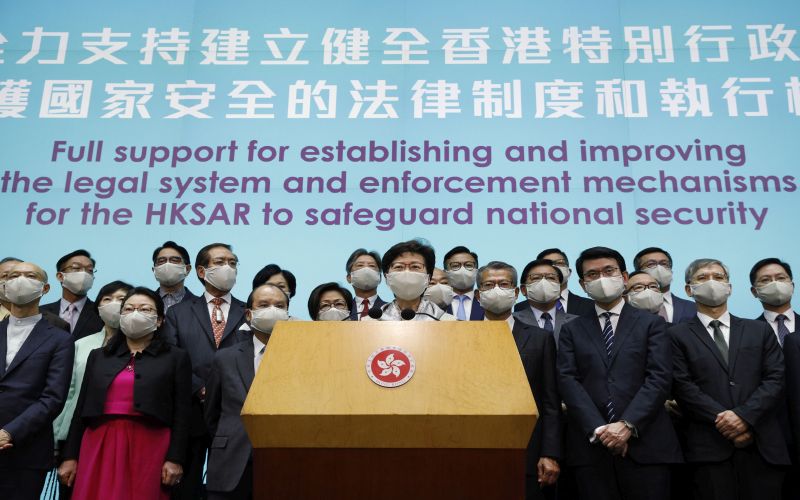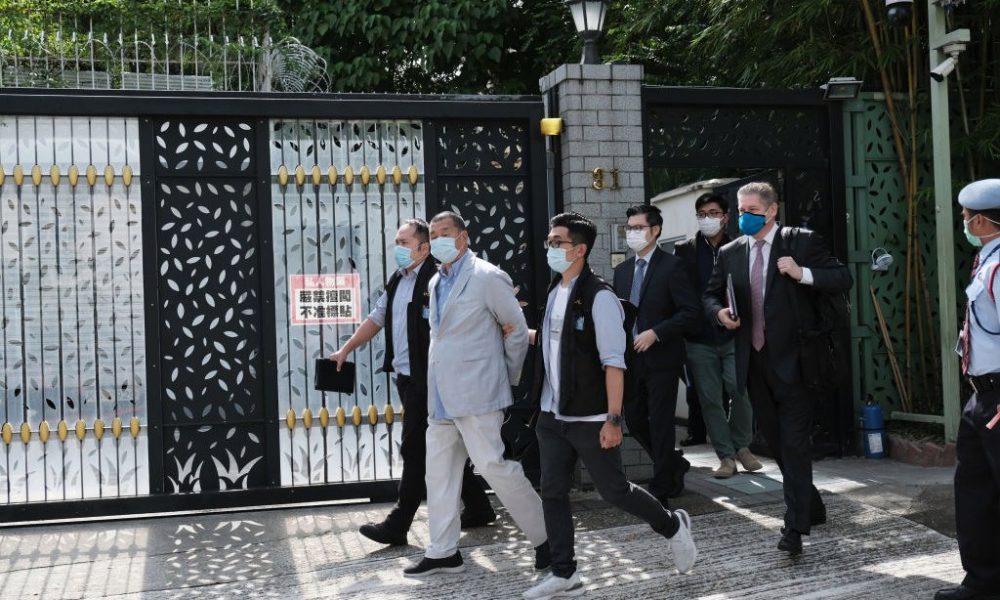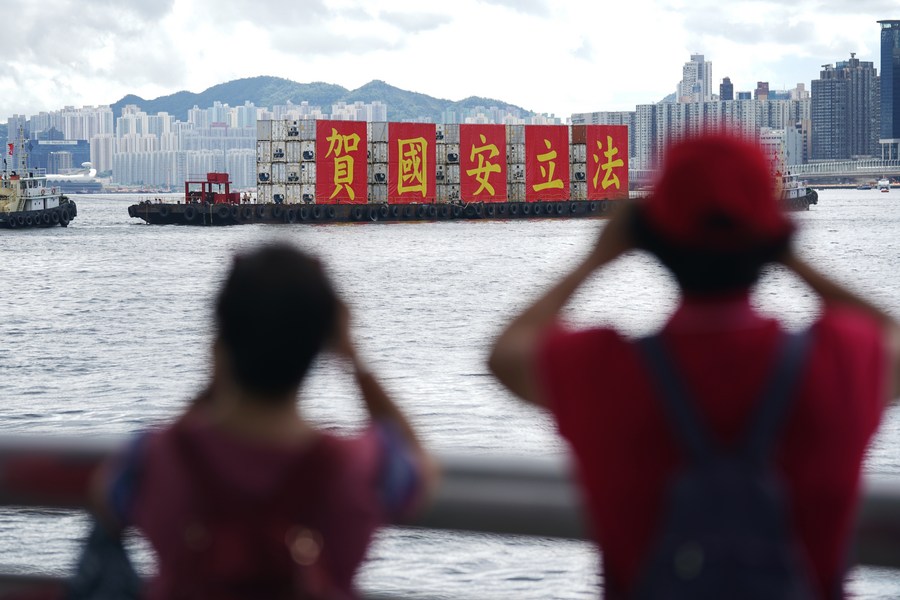Pulse on China
Hong Kong’s National Security Law
by Sonia Tan and Lingxiao Chen
“Pulse on China” is a series of articles comparing Mainland China’s media coverage of key events with those outside of China. Analysis is conducted by graduate students with native Chinese language skills and focus on Chinese affairs.
 China’s National Security Law (NSL) for Hong Kong, implemented on July 1st, bans secession, subversion, terrorism, and collusion with foreign external forces. A comparison of Mainland, Hong Kong, and international media coverage shows the divergent views, and such differences manifest in their analyses of the justifications for the law, and the law’s immediate effects and longer-term consequences for Hong Kong and China.
China’s National Security Law (NSL) for Hong Kong, implemented on July 1st, bans secession, subversion, terrorism, and collusion with foreign external forces. A comparison of Mainland, Hong Kong, and international media coverage shows the divergent views, and such differences manifest in their analyses of the justifications for the law, and the law’s immediate effects and longer-term consequences for Hong Kong and China.
The Hong Kong government has praised the legislation’s effectiveness, as several localist groups disbanded and the Hang Seng index rose before the law’s enactment. The Global Times asserts that “there is nothing in it that suppresses democracy and freedom in Hong Kong.” However, the arrest of pro-democracy media tycoon Jimmy Lai and other activists on August 10 has triggered another round of heated debate on the law’s encroachment on Hong Kong’s free press and other freedoms.
On August 7, the U.S. sanctioned Hong Kong’s Chief Executive Carrie Lam, Secretary for Justice Teresa Cheng, and nine other Hong Kong and Chinese officials for undermining Hong Kong’s autonomy. The sanctions freeze their assets in the U.S. and generally bar Americans from doing business with them. It is also suggested that international banks will be deterred from serving them.
As reported by the Global Times, Carrie Lam admits that the sanctions bring inconvenience as financial services including the use of credit cards will be hampered. However, the setback will not intimidate her and her colleagues, for they feel honorable being trusted by the Central government to implement the NSL. Another Global Times article reports that Lam ridiculed the U.S. for making a mistake on her residential address in the sanction information while omitting the detailed sanction policies. Joshua Lam, the younger son of Carrie Lam, who was studying at Harvard University, hurriedly returned to Hong Kong ahead of the issuing of the sanctions. Secretary for Justice Teresa Cheng dismissed the U.S.’s unlawful move and stated that her personal interests are nothing compared to the national interest. She did not respond to enquiries about how the sanctions could affect overseas assets held by her family, as the company owned by her husband sold shares in U.S. business after the sanctions were imposed.
 It is no surprise that none of the Mainland Chinese newspapers view the Hong Kong NSL negatively. They generally regard the law as a strong tool that fills the void in Hong Kong’s existing laws. Since 2014’s “Occupy Central”, Beijing has repeatedly warned and criticized foreign “anti-China” forces for colluding with domestic separatists. Therefore the media also praise NSL for its provision against foreign interference. Major central-level media outlets, such as the People’s Daily and Xinhua News, justify the law citing unwavering support from local officials, Hong Kong citizens and the international society, including from countries in friendly relations with China such as Cuba, Pakistan, Myanmar, Egypt, Belarus, and Venezuela. They argue that the law is a legitimate and essential step to stabilize Hong Kong’s society and economy, and to safeguard the safety and rights of the citizens, thus strengthening the “One Country Two System” in the long run.
It is no surprise that none of the Mainland Chinese newspapers view the Hong Kong NSL negatively. They generally regard the law as a strong tool that fills the void in Hong Kong’s existing laws. Since 2014’s “Occupy Central”, Beijing has repeatedly warned and criticized foreign “anti-China” forces for colluding with domestic separatists. Therefore the media also praise NSL for its provision against foreign interference. Major central-level media outlets, such as the People’s Daily and Xinhua News, justify the law citing unwavering support from local officials, Hong Kong citizens and the international society, including from countries in friendly relations with China such as Cuba, Pakistan, Myanmar, Egypt, Belarus, and Venezuela. They argue that the law is a legitimate and essential step to stabilize Hong Kong’s society and economy, and to safeguard the safety and rights of the citizens, thus strengthening the “One Country Two System” in the long run.
Interestingly, as July 1st is the founding anniversary of the Chinese Communist Party, the frontpages of many major newspapers devoted to the coverage of President Xi while the NSL’s passage appeared in less prominent spots. Most of the local-level or private-owned media produce minimum original content about the NSL. Instead, they often adapt, or are mandated, to reprint the version by the Xinhua news agency or CCTV, a standard practice for important news reporting in China.
The Southern Weekly, for example, tries to buttress Beijing’s argument by interviewing Regina Ip, former head of the Security Bureau of Hong Kong. Ip believes that protests such as Occupy Central and Anti-Extradition Bill have exposed the underlying problems in Hong Kong’s economic transformation and the internalization of national identity among the younger generation, so she is a strong advocate of the NSL. Ip urges that the Hong Kong government should earn back its citizens’ trust after Beijing offered its help. Similar opinion was seen on Yangcheng Evening News’ interviews with Junius Ho (member of Hong Kong’s legislative council) and Tam Yiu Chung (former chairman of Hong Kong DAB, and current member of NPCSC), both officials pointed out the government needs to understand, help and guide young Hongkongers. Removing the biased opinion and misinformation from the Hong Kong media would be the first step to rebuild the national identity of the youth. A Caixin’s article published on July 4 did a thorough review of the major events since the enactment of the law. It covered the support, opposition and concerns from related parties. In the end, the author struck a cautious note, quoting Carrie Lam’s words that it will not be easy for the Hong Kong government to solve the current political dilemma and to rebuild their relationship with the younger generation. Caixin’s report was probably as far as things could go in terms of representing the challenging side of the National Security Law.

As for the U.S. eliminating Hong Kong’s preferential trade status, the People’s Daily published an article online on July 24 that censured the U.S. for clinging to its ramshackle global hegemony and whitewashing violent crimes in Hong Kong, using phrases such as “speaking black into white (meaning to confuse right and wrong)”. A week later, a headline of the Global Times reports that Carrie Lam regards foreign sanctions as an illogical attempt to thwart China’s economic boom and development. On the other hand, the Chinese Ambassador to Britain Liu Xiaoming condemned the U.K. for following America's move in response to the U.K.’s sanctions. He emphasized “China has not changed. The western countries, led by the United States, launched the so-called ‘new cold war’ against China, sanctions, smears, and stigmatizes China.”
While the official state media tends to describe the clash between China and the West over the National Security Law as a form of “political” contestation, media that are local and private media outlets, such as Caixin or Southern Weekend show some uncertainties about the future of Hong Kong. Nevertheless, two common refrains in the Chinese language reporting on the NSL are paternalism (e.g. the central government steps in to quell the unrest) and victimhood (e.g. current impasse in Hong Kong is a legacy of colonialism, and Western countries have always used Hong Kong as basis to criticize China). These themes bolster Beijing’s narrative of justifying its actions because of failure by Hong Kong’s government to rein in the social unrest and manipulation by Western countries to compromise China’s national security.
Sample sources of Chinese media coverage on Hong Kong’s National Security Law |
|
解放日報下屬 上觀新聞 港警释放最新信号!清算“毒苹果”,细数黎智英触犯国安法“七宗罪” 環球時報轉載 国安法“亮剑”,黎智英党羽被一窝端!市民开香槟庆祝丨香港一日 環球網 香港国安法震慑!又一乱港分子秘密潜逃英国或投靠被通缉的罗冠聪 |
